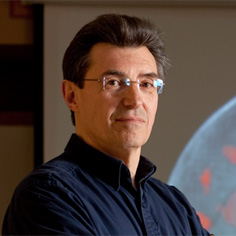Related Research Articles
In psychology, cognitivism is a theoretical framework for understanding the mind that gained credence in the 1950s. The movement was a response to behaviorism, which cognitivists said neglected to explain cognition. Cognitive psychology derived its name from the Latin cognoscere, referring to knowing and information, thus cognitive psychology is an information-processing psychology derived in part from earlier traditions of the investigation of thought and problem solving.

ACT-R is a cognitive architecture mainly developed by John Robert Anderson and Christian Lebiere at Carnegie Mellon University. Like any cognitive architecture, ACT-R aims to define the basic and irreducible cognitive and perceptual operations that enable the human mind. In theory, each task that humans can perform should consist of a series of these discrete operations.
A cognitive tutor is a particular kind of intelligent tutoring system that utilizes a cognitive model to provide feedback to students as they are working through problems. This feedback will immediately inform students of the correctness, or incorrectness, of their actions in the tutor interface; however, cognitive tutors also have the ability to provide context-sensitive hints and instruction to guide students towards reasonable next steps.
Situated cognition is a theory that posits that knowing is inseparable from doing by arguing that all knowledge is situated in activity bound to social, cultural and physical contexts.
In psychology and cognitive science, a schema describes a pattern of thought or behavior that organizes categories of information and the relationships among them. It can also be described as a mental structure of preconceived ideas, a framework representing some aspect of the world, or a system of organizing and perceiving new information, such as a mental schema or conceptual model. Schemata influence attention and the absorption of new knowledge: people are more likely to notice things that fit into their schema, while re-interpreting contradictions to the schema as exceptions or distorting them to fit. Schemata have a tendency to remain unchanged, even in the face of contradictory information. Schemata can help in understanding the world and the rapidly changing environment. People can organize new perceptions into schemata quickly as most situations do not require complex thought when using schema, since automatic thought is all that is required.

Problem solving is the process of achieving a goal by overcoming obstacles, a frequent part of most activities. Problems in need of solutions range from simple personal tasks to complex issues in business and technical fields. The former is an example of simple problem solving (SPS) addressing one issue, whereas the latter is complex problem solving (CPS) with multiple interrelated obstacles. Another classification of problem-solving tasks is into well-defined problems with specific obstacles and goals, and ill-defined problems in which the current situation is troublesome but it is not clear what kind of resolution to aim for. Similarly, one may distinguish formal or fact-based problems requiring psychometric intelligence, versus socio-emotional problems which depend on the changeable emotions of individuals or groups, such as tactful behavior, fashion, or gift choices.

James Lloyd "Jay" McClelland, FBA is the Lucie Stern Professor at Stanford University, where he was formerly the chair of the Psychology Department. He is best known for his work on statistical learning and Parallel Distributed Processing, applying connectionist models to explain cognitive phenomena such as spoken word recognition and visual word recognition. McClelland is to a large extent responsible for the large increase in scientific interest in connectionism in the 1980s.

The power law of practice states that the logarithm of the reaction time for a particular task decreases linearly with the logarithm of the number of practice trials taken. It is an example of the learning curve effect on performance. It was first proposed as a psychological law by Snoddy (1928), used by Crossman (1959) in his study of a cigar roller in Cuba, and played an important part in the development of Cognitive Engineering by Card, Moran, & Newell (1983). Mechanisms that would explain the power law were popularized by Fitts and Posner (1967), Newell and Rosenbloom (1981), and Anderson (1982).
Dedre Dariel Gentner is an American cognitive and developmental psychologist. She is the Alice Gabriel Twight Professor of Psychology at Northwestern University, and a leading researcher in the study of analogical reasoning.

Michael I. Posner is an American psychologist who is a researcher in the field of attention, and the editor of numerous cognitive and neuroscience compilations. He is emeritus professor of psychology at the University of Oregon, and an adjunct professor at the Weill Medical College in New York. A Review of General Psychology survey, published in 2002, ranked Posner as the 56th most cited psychologist of the 20th century.
Norman Henry Anderson was an American social psychologist and the founder of Information integration theory.
Domain-general learning theories of development suggest that humans are born with mechanisms in the brain that exist to support and guide learning on a broad level, regardless of the type of information being learned. Domain-general learning theories also recognize that although learning different types of new information may be processed in the same way and in the same areas of the brain, different domains also function interdependently. Because these generalized domains work together, skills developed from one learned activity may translate into benefits with skills not yet learned. Another facet of domain-general learning theories is that knowledge within domains is cumulative, and builds under these domains over time to contribute to our greater knowledge structure. Psychologists whose theories align with domain-general framework include developmental psychologist Jean Piaget, who theorized that people develop a global knowledge structure which contains cohesive, whole knowledge internalized from experience, and psychologist Charles Spearman, whose work led to a theory on the existence of a single factor accounting for all general cognitive ability.
Ron Sun is a cognitive scientist who made significant contributions to computational psychology and other areas of cognitive science and artificial intelligence. He is currently professor of cognitive sciences at Rensselaer Polytechnic Institute, and formerly the James C. Dowell Professor of Engineering and Professor of Computer Science at University of Missouri. He received his Ph.D. in 1992 from Brandeis University.

Marcel Just is D. O. Hebb Professor of Psychology at Carnegie Mellon University. His research uses brain imaging (fMRI) in high-level cognitive tasks to study the neuroarchitecture of cognition. Just's areas of expertise include psycholinguistics, object recognition, and autism, with particular attention to cognitive and neural substrates. Just directs the Center for Cognitive Brain Imaging and is a member of the Center for the Neural Basis of Cognition at CMU.
Cognitive strategies are the specific methods that people use to solve problems and/or exploit opportunities, including all sorts of reasoning, planning, arithmetic, etc. Importantly, a cognitive strategy need not be all "in the head", but will almost always interact with various aspects of what might be called the "execution context". A specific cognitive strategy would be implemented via a set of ordered and overlapping logic. Each logical aspect of a cognitive strategy is either taught or learned and needs to be remembered as situation foreknowledge. These cognitive strategies are memorized for future utilization. They can be thought of as consciously written and remembered "programs" or as the "software" that guides future brain-neuron processing. Each logic process helps to "add up" to a specific decision and resulting action.
George Mandler was an Austrian-born American psychologist, who became a distinguished professor of psychology at the University of California, San Diego.

Robert S. Wyer Jr. is a visiting professor at the University of Cincinnati and professor (emeritus) at the University of Illinois, Urbana-Champaign. He received his doctoral degree from the University of Colorado. Wyer Jr.'s research is centered on various facets of social information processing, encompassing:
Rational analysis is a theoretical framework, methodology, and research program in cognitive science that has been developed by John Anderson. The goal of rational analysis as a research program is to explain the function and purpose of cognitive processes and to discover the structure of the mind. Chater and Oaksford contrast it with the mechanistic explanations of cognition offered by both computational models and neuroscience.
Michelene (Micki) T. H. Chi is a cognitive and learning scientist known for her work on the development of expertise, benefits of self-explanations, and active learning in the classroom. Chi is the Regents Professor, Dorothy Bray Endowed Professor of Science and Teaching at Arizona State University, where she directs the Learning and Cognition Lab.
Thomas L. Griffiths is an Australian academic who is the Henry R. Luce Professor of Information Technology, Consciousness, and Culture at Princeton University. He studies human decision-making and its connection to problem-solving methods in computation. His book with Brian Christian, Algorithms to Live By: The Computer Science of Human Decisions, was named one of the "Best Books of 2016" by MIT Technology Review.
References
- ↑ National Academy of Sciences: Anderson, John R.
- ↑ "Book of Members, 1780–2010: Chapter A" (PDF). American Academy of Arts and Sciences. Retrieved April 18, 2011.
- ↑ See the list of Rumelhart prize winners on the Cognitive Science Society website Archived December 18, 2007, at the Wayback Machine .
- ↑ See the list of prize winners at the Heineken Prize page website.
- ↑ "Benjamin Franklin Medal in Computer and Cognitive Science". Franklin Institute. 2011. Archived from the original on July 31, 2012. Retrieved December 23, 2011.
- ↑ Anderson, J. R. & Lebiere, C. (1998). The atomic components of thought. Mahwah, NJ: Lawrence Erlbaum Associates
- ↑ Anderson, J. R. (2007). How can the human mind occur in the physical universe? New York: Oxford University Press
- ↑ Anderson, J. R. (1991). Is human cognition adaptive? Behavioral and Brain Sciences 14, 471–517.
- ↑ Anderson, J. R. (1990). "The adaptive character of thought". Hillsdale, NJ: Lawrence Erlbaum Associates.
- ↑ Anderson, John R.; Reder, Lynne M.; Simon, Herbert A.; K. Anders Ericsson; Robert Glaser (1998). Diane Ravitch (ed.). "Radical constructivism and cognitive psychology". Brookings Papers on Education Policy. 6 (1): 227–278..
- 1 2 "ACT-R » Publications » Can Neural Imaging Investigate Learning in an Educational Task?".
- ↑ "Discovering the Sequential Structure of Thought"
- ↑ "ACT-R » Publications » Brain Regions Engaged by Part- and Whole-task Performance in a Video Game: A Model-based Test of the Decomposition Hypothesis".